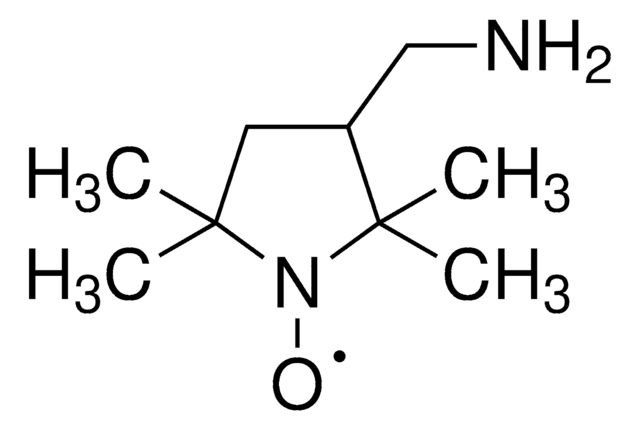253324
3-Carboxy-PROXYL
98%
Synonym(s):
3-(Carboxy)-2,2,5,5-tetramethyl-1-pyrrolidinyloxy, 3-Carboxy-2,2,5,5-tetramethyl-1-pyrrolidinyloxy, free radical
Sign Into View Organizational & Contract Pricing
All Photos(1)
About This Item
Empirical Formula (Hill Notation):
C9H16NO3
CAS Number:
Molecular Weight:
186.23
EC Number:
MDL number:
UNSPSC Code:
12352000
PubChem Substance ID:
NACRES:
NA.22
Recommended Products
Quality Level
Assay
98%
mp
200 °C (dec.) (lit.)
storage temp.
2-8°C
SMILES string
CC1(C)CC(C(O)=O)C(C)(C)N1[O]
InChI
1S/C9H16NO3/c1-8(2)5-6(7(11)12)9(3,4)10(8)13/h6H,5H2,1-4H3,(H,11,12)
InChI key
GEPIUTWNBHBHIO-UHFFFAOYSA-N
Looking for similar products? Visit Product Comparison Guide
Application
Spin-label that has been used to study molecular migration and long-term stability of seeds and pollen. Has been covalently attached to oligonucleotides to prepare a DNA probe sensitive to electron spin resonance. The acetoxymethyl ester is an esterase-sensitive probe that crosses the blood-brain barrier for electron spin resonance-computed tomographic imaging.
Spin-label. The anionic form has been used to determine distribution coefficients of neutral solubilizates in anionic micelles.
Used in the preparation of a tetraphenylporphyrin bearing a nitroxyl radical.
Storage Class Code
11 - Combustible Solids
WGK
WGK 3
Flash Point(F)
Not applicable
Flash Point(C)
Not applicable
Choose from one of the most recent versions:
Already Own This Product?
Find documentation for the products that you have recently purchased in the Document Library.
Customers Also Viewed
K Mäder et al.
Pharmaceutical research, 14(6), 820-826 (1997-06-01)
The purpose of this study was to compare drug release and polymer erosion from biodegradable P(FAD-SA) polyanhydrides in vitro and in vivo in real time and with minimal disturbance of the investigated system. P(FAD-SA) 20:80 and P(FAD-SA) 50:50 polymer tablets
M Alecci et al.
Physics in medicine and biology, 43(7), 1899-1905 (1998-08-14)
The use of RF (100 to 300 MHz) PEDRI and CW-EPR techniques allows the in vivo study of large animals such as whole rats and rabbits. Recently a PEDRI instrument was modified to also allow CW-EPR spectroscopy with samples of
S Zöllner et al.
The Journal of biological chemistry, 272(37), 23076-23080 (1997-09-12)
Nitroxides are known to exert superoxide dismutase-mimetic properties and to decrease O-2- and H2O2-mediated cytotoxicity. However, the effect of nitroxides on .NO homeostasis has not been studied yet. The present study investigates the effect of nitroxides on the detectable amount
M Alecci et al.
Biophysical journal, 67(3), 1274-1279 (1994-09-01)
A radio frequency (RF) (280 MHz) electron paramagnetic resonance (EPR) spectroscopy and imaging apparatus has been used to localize a pyrrolidine nitroxide free radical in the rat abdomen and thorax. The nitroxide 2,2.5.5,-tetramethylpyrrolidine-1-oxyl-3- carboxylic acid (PCA) had a whole body
M A Foster et al.
Physics in medicine and biology, 43(7), 1893-1897 (1998-08-14)
Proton-electron double-resonance imaging (PEDRI) has considerable value for study of the distribution and elimination pathways of nitroxide free radicals (NFRs). This has been illustrated by its use in studies of kidney function in the living rat in which the NFR
Our team of scientists has experience in all areas of research including Life Science, Material Science, Chemical Synthesis, Chromatography, Analytical and many others.
Contact Technical Service








